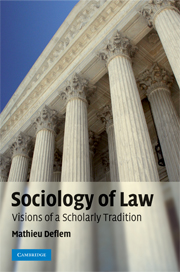Book contents
- Frontmatter
- Contents
- Preface and acknowledgements
- Introduction: sociology, society, law
- Part I Theoretical foundations of the sociology of law
- 1 Law and the rise of the social sciences
- 2 Max Weber on the rationalization of law
- 3 Emile Durkheim on law and social solidarity
- Part II Development and variations of the sociology of law
- Part III Sociological dimensions of law
- Part IV Special problems of law
- Conclusion: Visions of the sociology of law
- Bibliography
- Index
2 - Max Weber on the rationalization of law
Published online by Cambridge University Press: 05 June 2012
- Frontmatter
- Contents
- Preface and acknowledgements
- Introduction: sociology, society, law
- Part I Theoretical foundations of the sociology of law
- 1 Law and the rise of the social sciences
- 2 Max Weber on the rationalization of law
- 3 Emile Durkheim on law and social solidarity
- Part II Development and variations of the sociology of law
- Part III Sociological dimensions of law
- Part IV Special problems of law
- Conclusion: Visions of the sociology of law
- Bibliography
- Index
Summary
Among the sociological classics, Max Weber is widely considered the founding father par excellence of the modern sociology of law. When Weber observed that social life in the modern era had become more and more rationalized in a purposive-rational sense, he not only contemplated the central role of economy, state, and bureaucracy, but along with it also discussed the role of law as the basis of modern political authority. Weber specifically outlined the characteristics of a formally rationalized legal system that is primarily guided by the application of procedures. Yet Weber's work offers not merely a detailed presentation of the unique features of modern law. His analysis of law is an intrinsic part of his sociology, in terms of both its perspective to the study of society and its theoretical propositions on the conditions of modern society.
Weber developed his perspective on law as part of a more general sociology, the contours of which will have to be explained first in order to fully grasp his theory of law. In the systematic nature and comprehensive scope of its contribution, Weber's analysis is rivaled only by that of Emile Durkheim, whose sociology of law was likewise part and parcel of a more fundamental sociological perspective and theory of society. It will therefore be useful in this chapter to situate Weber's sociology of law in the context of his sociological approach and theory of society, not merely to fully understand Weber's contribution to the study of law, but also to be able to usefully contrast it in the next chapter with Durkheim's thought as the two most foundational contributions to the sociology of law.
- Type
- Chapter
- Information
- Sociology of LawVisions of a Scholarly Tradition, pp. 37 - 55Publisher: Cambridge University PressPrint publication year: 2008



